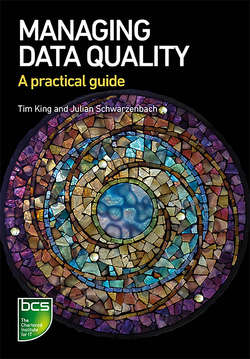Читать книгу Managing Data Quality - Tim King - Страница 15
На сайте Литреса книга снята с продажи.
Оглавлениеxv
PREFACE
Data are all around us1; the volume of data is growing at exponential rates and our lives are increasingly being supported and enabled by the exploitation of data. Despite this, many organisations struggle to effectively manage data and the quality of these data.
The reliance of organisations (and society) on data is a relatively new phenomenon; the techniques to manage data effectively are still developing and wider awareness of these approaches is generally low.
This book is titled Managing Data Quality: A Practical Guide very deliberately; its focus is to provide you with an understanding of how to manage data quality, and practical guidance to achieve this.
Enterprise data quality
This book does not just examine quality issues in single data databases or data stores. Instead, we also look at the wider set of issues arising in a typical organisation where there are multiple data stores that are not always formally managed, have been developed at different times, are constrained by different software tools and will be inputs and outputs of many different business processes.
Managing this landscape of different data stores is complex enough when there is a lack of agreement over which is the most trusted, or ‘master’, data source. This complexity increases, however, in most organisations where a large amount of data are also gathered, stored and manipulated in user-created spreadsheets and databases that often exist ‘below the radar’ of corporate governance approaches and controls.
Depending on the organisational context, this chaotic landscape presents a range of risks (and issues) to the organisation, which might be financial, regulatory, commercial,
Keith Gordon’s book, Principles of Data Management (2013) also takes an enterprise view of data. Keith’s book was published before ISO 8000-61, the international standard that specifies a process reference model for data quality management. This process model is the basis for our approach to enterprise data quality.
1 Please note, some readers will generally use the word ‘data’ in the singular; the BCS convention is to use this word as plural.
